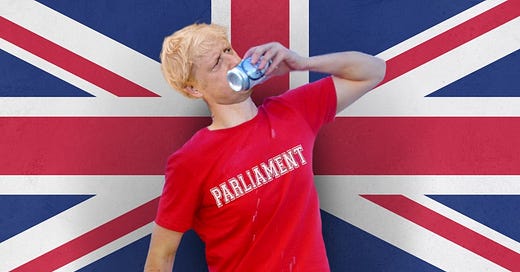Boris Johnson's Fall Tells Us Something About What Voters Care About
Learning from others' mistakes
Until recently, I had been one-quarter-following the Boris Johnson “garden party” scandal, and I didn’t really get it. “So,” I thought, “you’re telling me that people were drinking when they probably should not have been drinking…in Britain. BRITAIN! The country that’s basically a floating pub that was granted nationhood — you’re saying that in that country people were having social gatherings in which they consumed alcohol in a not-very-responsible way. I REFUSE TO BELIEVE IT.”
The scandal makes even less sense when you factor in Boris Johnson. Isn’t his whole schtick that he’s a fuckup and a scamp? He’s been married several times, has a rugby team worth of kids, isn’t religious, and admitted to having used cocaine — aren’t you at least a little bit scandal-proof once you’ve successfully branded yourself as The Prime Minister Who Fucks? Also, considering that Johnson won in a landslide, delivered on his promise to finish Brexit, and has been getting otherwise-passing marks for his handling of Covid, wouldn’t his popularity before the scandal cause the public to give him a pass?
But now that I’ve learned about the specifics of the scandal, I completely get it. This is poison — Johnson might not survive as PM. Viewed one way, it remains a bit odd; nobody was harmed, there were no negative policy consequences, and the scandal didn’t involve any of the sexy/evil Machiavellian stuff that fuels most episodes of House of Cards. But, viewed another way, the scandal so perfectly offends people’s core sensibilities that it’s obviously an enormous liability. I think the incident is worth examining to hopefully teach us something about how people relate to their elected officials.




